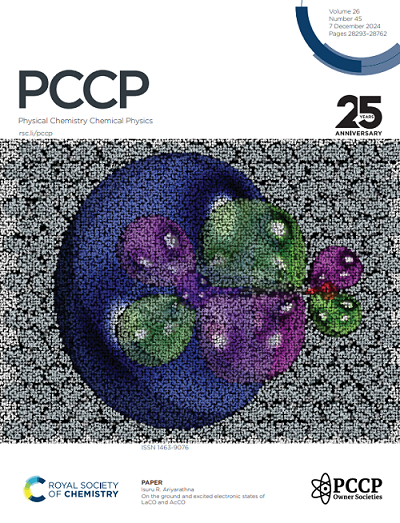Magnetic phase transition and magnetocaloric effect in hexagonal MnCoGe alloys mediated by axial strain: A Monte Carlo study
IF 2.9
3区 化学
Q3 CHEMISTRY, PHYSICAL
引用次数: 0
Abstract
We report numerical studies of the magnetic phase transition and magnetocaloric effect in hexagonal MnCoGe alloys, controlled by axial strain applied along the c-axis direction around room temperature. These studies are based on a combination of first-principles calculations and Monte Carlo simulations. Under compressive strains, the ferromagnetic state is stable, whereas under tensile strains, the ground state transforms into an antiferromagnetic state. The magnetic exchange couplings between elements are quantified using an SPR-KKR code, revealing that the exchange coupling between the first to fourth nearest-neighbor Mn-Mn pairs primarily determine the magnetic phase transition behaviors. By varying the compressive strains from 0% to -7.8%, the magnetic phase transition temperature increases monotonically from 284 K to 319 K. Additionally, the maximum magnetic entropy change under a magnetic field change of ΔH = 1 T decreases to one-third of its value without applied strains and occurs at higher temperatures. The second-order magnetic phase transition properties influenced by strains are also discussed. Our findings indicate that the strain not only enhances the magnetic stability of alloy but also improves the linear control of magnetocaloric effect by magnetic field.求助全文
约1分钟内获得全文
求助全文
来源期刊

Physical Chemistry Chemical Physics
化学-物理:原子、分子和化学物理
CiteScore
5.50
自引率
9.10%
发文量
2675
审稿时长
2.0 months
期刊介绍:
Physical Chemistry Chemical Physics (PCCP) is an international journal co-owned by 19 physical chemistry and physics societies from around the world. This journal publishes original, cutting-edge research in physical chemistry, chemical physics and biophysical chemistry. To be suitable for publication in PCCP, articles must include significant innovation and/or insight into physical chemistry; this is the most important criterion that reviewers and Editors will judge against when evaluating submissions.
The journal has a broad scope and welcomes contributions spanning experiment, theory, computation and data science. Topical coverage includes spectroscopy, dynamics, kinetics, statistical mechanics, thermodynamics, electrochemistry, catalysis, surface science, quantum mechanics, quantum computing and machine learning. Interdisciplinary research areas such as polymers and soft matter, materials, nanoscience, energy, surfaces/interfaces, and biophysical chemistry are welcomed if they demonstrate significant innovation and/or insight into physical chemistry. Joined experimental/theoretical studies are particularly appreciated when complementary and based on up-to-date approaches.
 求助内容:
求助内容: 应助结果提醒方式:
应助结果提醒方式:


